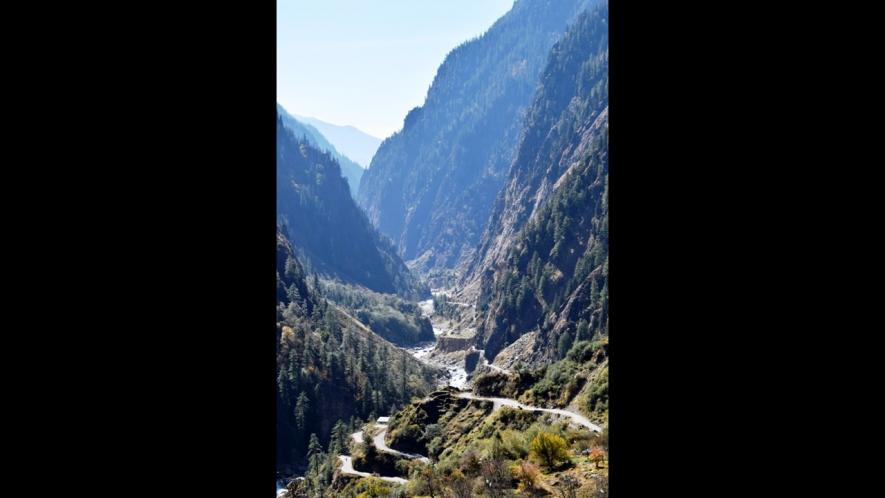Uttarakhand Govt Cancels 5-Year Climate Change Centre Project Midway

Himalayan region of Gangotri. | Image credit: Hemant Dhyani
It has been documented by climate scientists that Indian Himalayan region is one of the most climate-sensitive regions of the country, which also provides critical ecosystem services for communities in mountains and downstream plains.
Uttarakhand, which is blessed with a series of rivers, glaciers and forests, is a region among the most vulnerable to climate risks among Himalayan states. Several studies have attributed some recent natural catastrophes and extreme weather events, such as receding glaciers, upwardly moving snowline, depleting natural resources, erratic rainfall and weather pattern, fluctuations in the flowering behaviour of plants, drying up of perennial streams, etc. to this gradual warming of climate.
In such a scenario, when studies and programmes related to climate change in Uttarakhand should have been given further impetus, cancelling the five-year ongoing project of establishing/strengthening the State Climate Change Centre (SCCC) under the National Mission for Sustaining Himalayan Ecosystem, just a year short of completion, has come as a shock to environmentalists.
The project was sanctioned by the Department of Science and Technology (DST) under the Union Ministry of Science & Technology, on August 18, in 2016. R.N.Jha, principal Investigator (Indian Forest Service officer) and six research staff, which includes two research associates and four junior research fellows, were engaged with the project.
“The project cancellation has been done without consultation with and approval of DST. Also, the project research staff has been put at the disposal of the independent wing of the Directorate of Environment, Conservation and Climate Change (DOEC&CC),” said Jha, adding that this “cancellation is in direct contradiction to the very objective of the project aimed at strengthening/establishing State Climate Change Centre. “
In his letter to the head of forest force (HoFF), Jha also said that: “Moreover, the engagement of the project staff in anyway other than as stipulated in the sanctioned project would be a violation of the terms and conditions of the project.”
Jha also expressed his resentment over another directive by the Uttarakhand government asking him act as a coordinator for the formulation of a State Action Plan for Climate Change and continue to lead the works on climate projections and vulnerability studies of Uttarakhand with the help of the given project staff.
“This directive stands in sharp contradiction to the order on cancellation of project. Once, the State Climate Change Centre is wound up and the project staff are placed at the disposal of DOEC&CC , there is no way the climate research work may continue without constituting the SCCC and the project staff as an independent wing of the Directorate,” he wrote.
Jha said already the four-year term of the project was over. So, neither can the project be abandoned without the approval of the GoI nor can the research staff of the project, who have been trained and engaged for the specified objectives, be detached from the project.
As an alternative, he suggested that the project may remain anchored to the Department of Forests, Uttarakhand, reasoning that the principal chief conservator of forests was the declared head of the institution, as per the project document.
Jairaj, the head of forest force, who is also head of SCCC, told NewsClick: “I have no problem if the state government wishes to bring the climate change wing under the ambit of DOEC&CC. However, I want the project to complete its term and hence have written to the government not to cancel such an important project. It is not yet clear to us why the state government has decided to revoke it. I am awaiting a reply.”
The approved objectives /work plan of the project was to collate available scientific information/knowledge and data on climate change pertaining to the state, develop detailed climate vulnerability and risk analyses covering all districts, as well as specific analyses pertaining to each of the sectors addressed in the Uttarakhand Action Plan on Climate Change. Third, improve scientific evidence base and coordination mechanisms between scientific research and academic institutions (including national and state-level agencies) for building a scientific data and evidence base for the state, and develop a Climate Change Knowledge portal. Finally, evaluation of policy alternatives for development plans for key sectors.
Besides establishing a State Climate Change Centre, a research lab was also set up with grant from the DST.
Ever since its inception, the SCCC has been supplemented with supporting institutions, such as Climate Action Group, Sectoral Working Groups on Climate Change for certain key sectors, and Knowledge Management Group, comprising members from various institute/departments.
The SCCC, with support from various partners such as the United Nation Development Programme, Swiss Agency for Development and Cooperation, Climate and Development Knowledge Network, World Resource Institute etc., has formulated a programme named, Climate Actions, which emphasise integration of other pilot projects, such as SAPCC, Vulnerability and Risk Assessment, Climate Action Agenda and Climate Knowledge Portal with the development planning of the state.
These pilot projects were supplemented with an Environment Ministry-UNDP-SDC project “Strengthening State Strategy for Climate Actions (3SCA)”.
“There were important pilot projects under 3SCA project. For example, the project, Building Climate Resilience of Forest Dependent Communities, at Jaunpur block, was successfully completed with the support of various line departments. In continuation, the second phase of SCA-Himalayas project has been further proposed and is currently the subject of negotiations between GoI and Switzerland, which focuses on the springshed management, glaciological management for integrated management of water resources and disaster risk management in the state of Uttarakhand,” Jha wrote in his letter.
He further explained that major ongoing tasks which may get severely affected due to cancellation are fine-tuning of climate vulnerability & risk assessment version-2 in accordance with latest IPCC framework, upgradation or revision of State Action Plan on Climate Change, in line with Nationally Determined Contributions, Sustainable Development Goals and other priorities of the government of India.
The writer is an independent environment journalist based in Chandigarh.
Get the latest reports & analysis with people's perspective on Protests, movements & deep analytical videos, discussions of the current affairs in your Telegram app. Subscribe to NewsClick's Telegram channel & get Real-Time updates on stories, as they get published on our website.
























